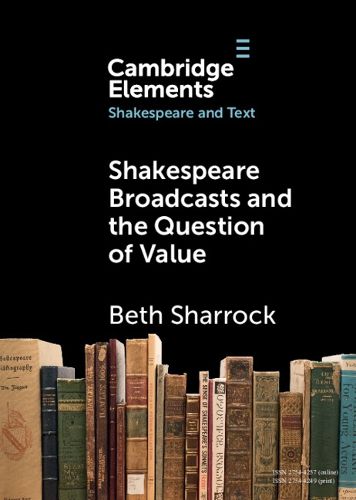Readings Newsletter
Become a Readings Member to make your shopping experience even easier.
Sign in or sign up for free!
You’re not far away from qualifying for FREE standard shipping within Australia
You’ve qualified for FREE standard shipping within Australia
The cart is loading…






This Element investigates the framing 'texts' of Shakespeare's works in live theatre broadcasts produced by the Royal Shakespeare Company. Despite growing engagement from scholars of digital Shakespeares with the phenomenon of broadcast theatre and the aesthetics of filmed productions, the paratexts which accompany the live-streams ? live or pre-recorded features, including interviews and short films ? have largely been ignored. The Element considers how RSC live broadcasts of rarely performed, often critically maligned works are mediated for contemporary audiences, focusing on The Two Gentlemen of Verona (2014), Titus Andronicus (2017), and The Merry Wives of Windsor (2018). It questions the role of the theatre institution as a powerful broker in the (re)negotiation of hierarchies of value within Shakespeare's canon. Individual sections also trace the longer genealogies of paratextual value-narratives in print, proposing that broadcast paratexts be understood as participating in a broader history of Shakespearean paratexts in print and performance.
$9.00 standard shipping within Australia
FREE standard shipping within Australia for orders over $100.00
Express & International shipping calculated at checkout
This Element investigates the framing 'texts' of Shakespeare's works in live theatre broadcasts produced by the Royal Shakespeare Company. Despite growing engagement from scholars of digital Shakespeares with the phenomenon of broadcast theatre and the aesthetics of filmed productions, the paratexts which accompany the live-streams ? live or pre-recorded features, including interviews and short films ? have largely been ignored. The Element considers how RSC live broadcasts of rarely performed, often critically maligned works are mediated for contemporary audiences, focusing on The Two Gentlemen of Verona (2014), Titus Andronicus (2017), and The Merry Wives of Windsor (2018). It questions the role of the theatre institution as a powerful broker in the (re)negotiation of hierarchies of value within Shakespeare's canon. Individual sections also trace the longer genealogies of paratextual value-narratives in print, proposing that broadcast paratexts be understood as participating in a broader history of Shakespearean paratexts in print and performance.